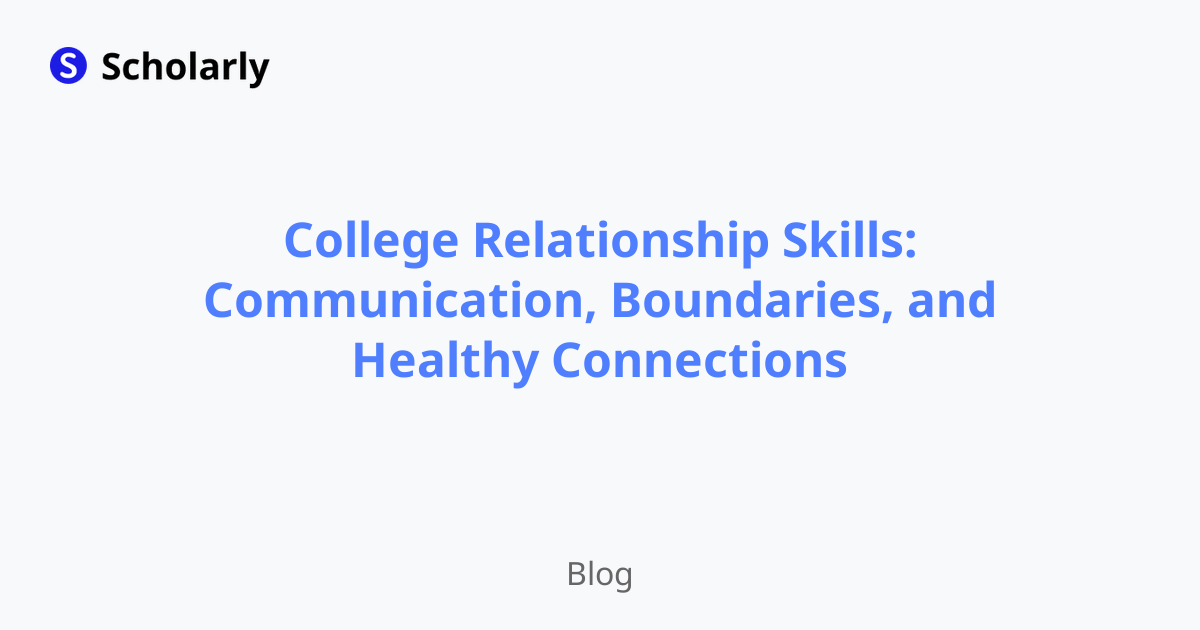College Relationship Skills: Communication, Boundaries, and Healthy Connections
Build strong, healthy relationships in college with essential skills for communication, boundary-setting, and navigating complex social dynamics.

Introduction
College relationships—whether romantic, friendship, or academic—require skills that many students have never had to develop. Living in close quarters, managing stress, and navigating newfound independence create unique relationship challenges. Learning to communicate effectively, set boundaries, and build healthy connections is crucial for both college success and lifelong relationship satisfaction.
Methods
1. Communication Fundamentals
Active Listening Skills:
- Give full attention without planning your response
- Ask clarifying questions to ensure understanding
- Reflect back what you heard to confirm accuracy
- Avoid interrupting or immediately offering solutions
Assertive Communication:
- Express needs and feelings clearly and respectfully
- Use "I" statements instead of "you" accusations
- Be direct about expectations and boundaries
- Practice saying no without guilt or over-explanation
Conflict Resolution:
- Address issues directly rather than avoiding them
- Focus on specific behaviors, not personality traits
- Look for win-win solutions that address both parties' needs
- Know when to agree to disagree and move forward
2. Boundary Setting and Maintenance
Personal Boundaries:
- Identify your values, limits, and non-negotiables
- Communicate boundaries clearly and consistently
- Recognize when boundaries are being crossed
- Be willing to enforce consequences when necessary
Digital Boundaries:
- Set limits on social media interaction and sharing
- Maintain privacy settings appropriate for your comfort level
- Establish phone-free times for quality in-person interaction
- Avoid cyberstalking or excessive monitoring of others
Academic Boundaries:
- Balance group study with individual work needs
- Set limits on helping others with assignments
- Maintain academic integrity in collaborative work
- Protect your time and energy for your own success
3. Navigating Different Relationship Types
Friendships:
- Build diverse friendships rather than relying on one person
- Balance giving and receiving support
- Handle changing dynamics as people grow and change
- Maintain long-distance friendships while building new ones
Romantic Relationships:
- Maintain individual identity within the relationship
- Balance couple time with friend time and academics
- Discuss future goals and timeline expectations
- Handle breakups with maturity and respect
Family Relationships:
- Renegotiate family dynamics as you become more independent
- Set boundaries around family involvement in college decisions
- Maintain connection while establishing autonomy
- Handle family conflicts or disappointments constructively
4. Social Skills for College Success
Group Dynamics:
- Contribute meaningfully to group projects and discussions
- Handle difficult group members diplomatically
- Share leadership and follow others when appropriate
- Build consensus while respecting different viewpoints
Professional Relationships:
- Interact appropriately with professors and staff
- Build mentoring relationships with faculty and older students
- Network authentically without being transactional
- Maintain professional boundaries in academic settings
Benefits
- Improved Mental Health: Healthy relationships reduce stress and increase happiness
- Academic Success: Good relationships enhance collaborative learning and support
- Career Development: Relationship skills are essential for professional success
- Personal Growth: Relationships provide opportunities for self-discovery and development
Challenges
- Time Management: Balancing relationships with academic and personal responsibilities
- Conflict Avoidance: Tendency to avoid difficult conversations or confrontations
- Boundary Confusion: Difficulty distinguishing between healthy and unhealthy relationship dynamics
- Social Anxiety: Fear of rejection or judgment affecting relationship building
Conclusion
Strong relationship skills are as important as academic abilities for college success and life satisfaction. Invest time in developing communication skills, setting healthy boundaries, and building meaningful connections. The relationship skills you develop in college will serve you throughout your personal and professional life, making them one of the most valuable areas for growth and development.
Try Our Popular AI Study Tools
Transform your study materials into interactive learning experiences with our most popular AI-powered tools:
PDF to Flashcards
Convert lecture notes and textbooks into study flashcards instantly
Text to Flashcards
Turn any text or notes into comprehensive flashcard sets
Image to Flashcards
Convert diagrams and handwritten notes into digital flashcards
YouTube to Flashcards
Generate flashcards from educational video content



